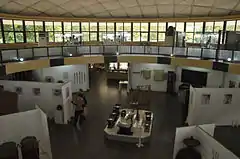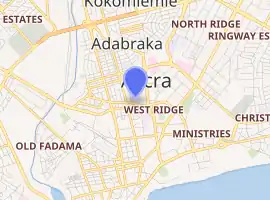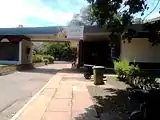National Museum of Ghana
The National Museum of Ghana is in the Ghanaian capital, Accra. It is the largest and oldest of the six museums under the administration of the Ghana Museums and Monuments Board (GMMB).
| National Museum of Ghana | |
|---|---|
 Inside view of the National Museum of Ghana | |

| |
| General information | |
| Architectural style | Eclectic and modern |
| Address | 2 Barnes Road in Central Accra |
| Town or city | Accra, Greater Accra |
| Country | Ghana |
| Coordinates | 5°33′24″N 0°12′28″W |
| Construction started | 1956 |
| Completed | 1957 and 2002 |
| Inaugurated | 5 March 1957 |
| Renovated | 2011 |
| Website | |
| Official website | |
The museum building was opened on 5 March 1957 as part of Ghana's independence celebrations. The official opening was performed by the Duchess of Kent, Princess Marina. The Museum's first Director was A.W. Lawrence.[1]
Objects of archaeology, ethnography as well as fine art find place in the National Museum building.
 Main entrance of National Museum of Ghana
Main entrance of National Museum of Ghana National Museum of Ghana
National Museum of Ghana
Objects in the archeology section range from the Stone Age period to the recent historical past. Those on permanent exhibition at the ethnography gallery include chief's regalia, indigenous Ghanaian musical instruments, gold weights, beads, traditional textiles, stools and pottery. There are also objects from other African countries acquired through exchange. Examples are Senfu masks from Ivory Coast, Zulu wooden figures and bead-ware from Southern Africa. In addition there are also ancient Ife bronze heads from Nigeria and Bushongo carvings from the Congo. Exhibits at the small but impressive art gallery consist mainly of contemporary Ghanaian paintings executed in oils, pastels, acrylics, watercolours and collages. Apart from these there are sculpture pieces in different media.
References
- R. M. Cook, ‘Lawrence, Arnold Walter (1900–1991)’, Oxford Dictionary of National Biography, Oxford University Press, Sept 2004; online edn, May 2009
